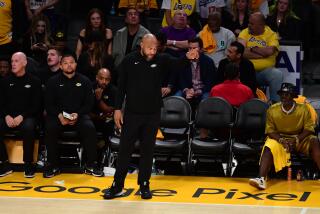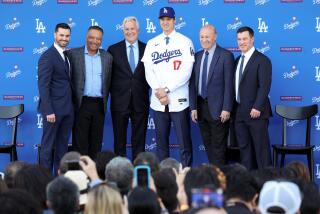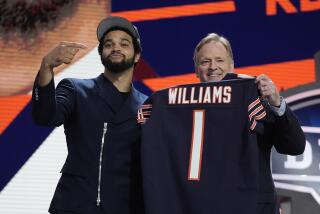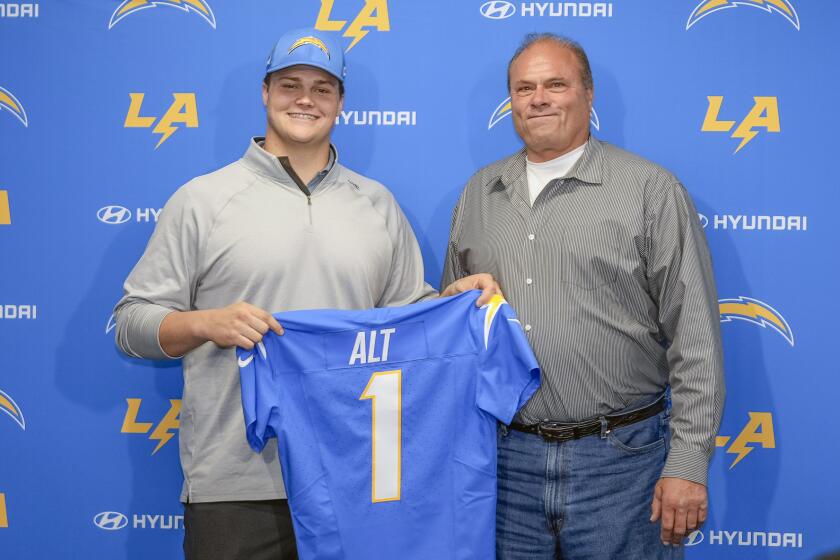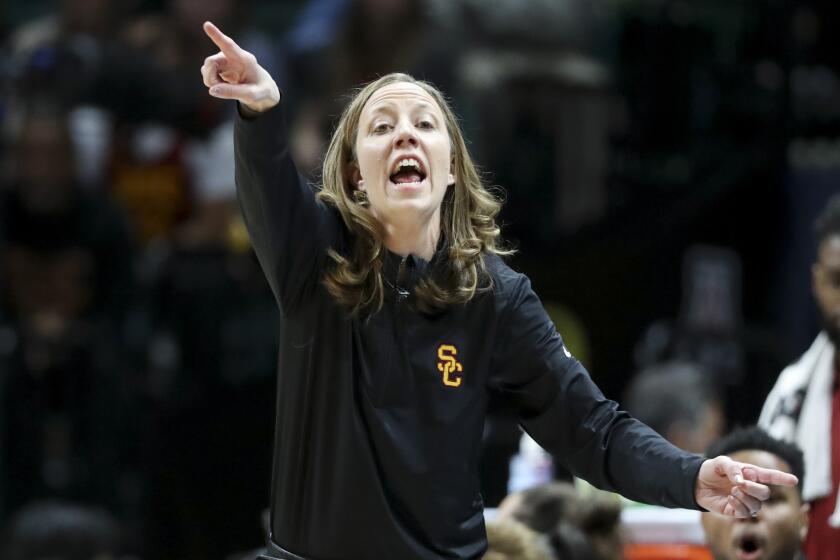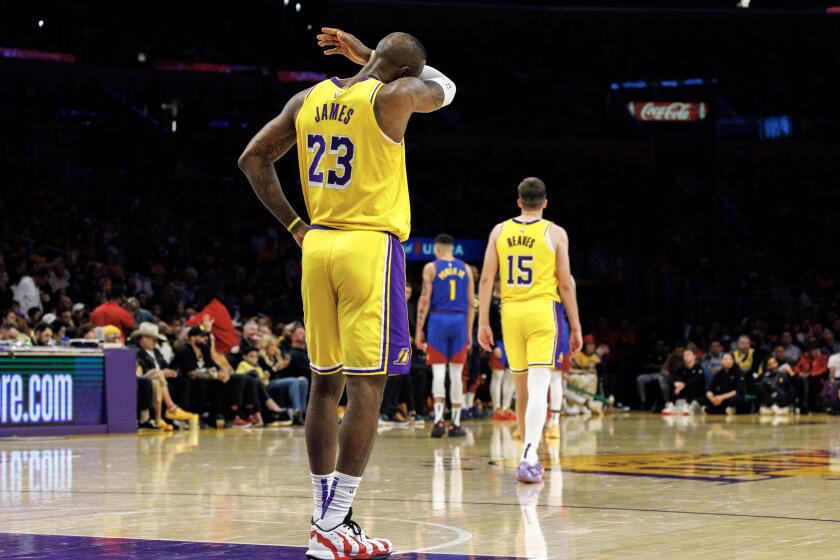Don’t get all defensive about Heisman debate
Notre Dame senior linebacker Manti Te’o is not going to win the Heisman Trophy on Saturday night. Texas A&M; quarterback Johnny Manziel is poised to become the first freshman to win in the award’s 78-year history.
Te’o will finish second ahead of Kansas State quarterback Collin Klein.
This isn’t Nate Silver accurate, but a straw poll of 11 voters conducted by the website HeismanPundit.com has Manziel winning comfortably. Manziel garnered eight first-place votes; Te’o received one.
Defense may win championships, but, in college, it always settles for the Bronko Nagurski Trophy. A true defensive player again will be denied the Heisman, allegedly given to the nation’s most outstanding player.
Cornerback Charles Woodson won for Michigan in 1997, but he also played receiver and returned kicks.
The truth is, the Heisman skews heavily in favor of players who score touchdowns.
When might a defense-only player win?
“I don’t think it will ever happen,” Chris Huston, who operates HeismanPundit, said this week. “It’s not that voters don’t like defensive players. Football is not set up for them to make their cases. The less you touch the football, the harder it is to win the Heisman.”
Defensive players have outpointed Heisman winners, they just haven’t been able to get synchronized with the award.
In 1980, Pittsburgh defensive end Hugh Green finished second to George Rogers but ahead of Georgia freshman Herschel Walker, who won the Heisman two years later. In 2009, Nebraska nose guard Ndamukong Suh outpointed Tim Tebow to finish fourth in the voting, one place ahead of the Florida quarterback. (Tebow won the award two years earlier, as a sophomore.)
Plenty of defensive players have turned out to be the better pro player.
In 1998, running back Ricky Williams won the Heisman for Texas with 714 first-place votes. Champ Bailey, a brilliant defensive back at Georgia, finished a distant seventh with six first-place votes. Williams mostly fizzled as a pro, and Bailey is headed for the Hall of Fame.
In 2001, quarterback Eric Crouch took home the trophy for Nebraska. Dwight Freeney of Syracuse finished ninth that year and Julius Peppers of North Carolina finished 10th.
A solid case can be been made this year for Te’o, the heart and soul of Notre Dame’s undefeated run to the national title game.
Te’o recorded all seven of his career interceptions as a senior, which ties him second nationally. However, it is difficult for many voters to measure Te’o’s worth relative to his team. The linebacker is tied for only 59th nationally in tackles, which doesn’t seem like a Heisman-worthy place.
“I don’t think defensive players can win the Heisman, because they can’t score,” Heisman voter Dennis Dodd of CBS Sports said. “In general, yards talk, tackles don’t.”
Notre Dame’s defense would still be stout without Te’o, yet it is almost impossible to conceive of Texas A&M; being 10-2 without Manziel.
Quarterbacks and running backs have a disproportional advantage because they affect a game more directly. Can anyone fathom Auburn, two years ago, winning the national title without Cam Newton?
Football is unlike baseball, a sport in which telling analysis can be applied to each position. Baseball factors such as WAR (wins above replacement) can be used to quantify a season such as the one Angels rookie Mike Trout just enjoyed.
Grading a defensive player in football is trickier. Is the safety who leads the nation in tackles doing so because he’s a great player or because his team’s defensive front is lousy?
Manziel’s numbers are not murky. He amassed 4,600 yards of total offense while performing in the Southeastern Conference, the nation’s best league. Manziel also was dazzling in his team’s nationally televised upset of then-top-rated Alabama.
Mark Blaudschun, a longtime Heisman voter who recently retired from the Boston Globe, said he would have no problem voting a defensive player first. He attended the Notre Dame-Boston College game with the express purpose of focusing on Te’o.
“I went into the game looking for him to do something,” Blaudschun said. “I didn’t hear his name called the whole night.”
Blaudschun submitted his Heisman vote in this order: Manziel, Te’o and USC receiver Marqise Lee.
Voters in Oklahoma caught Te’o on the night his fourth-quarter interception secured Notre Dame’s impressive upset win in Norman. So it’s no surprise that all four Heisman voters from the Daily Oklahoman had Te’o first on their ballots.
Columnist Jenni Carlson said she thought Te’o was a decisive, consistent presence. She noted Manziel did not have great games in losses to Florida and Louisiana State, while conceding the Florida game was Manziel’s first college start.
In the end, Carlson picked Te’o. “I just really felt like he was on a team that wins with defense, and largely wins with defense because of him,” she said.
She added: “I’m pretty sure I voted for the guy who is not going to win.”
The Times doesn’t allow its reporters to participate in awards, so I surrendered my Heisman vote years
ago. My top three would have been Manziel, Te’o and Lee.
I watched Te’o in several games and acknowledge him as Notre Dame’s indispensable, spiritual and inspirational leader. However, in the end it was impossible for me to conclude Te’o had more impact over his team’s win-loss record than Manziel.
I agree with Huston of HeismanPundit: “There is no acute bias against defensive players. There is structural bias... When you read a recap of a game, even a Notre Dame game, I defy you to find one AP recap with Manti Te’o’s tackle numbers... All defensive stats are shrouded in mystery.”
And with that, so much for the mystery of this year’s Heisman race.
--
More to Read
Get our high school sports newsletter
Prep Rally is devoted to the SoCal high school sports experience, bringing you scores, stories and a behind-the-scenes look at what makes prep sports so popular.
You may occasionally receive promotional content from the Los Angeles Times.
